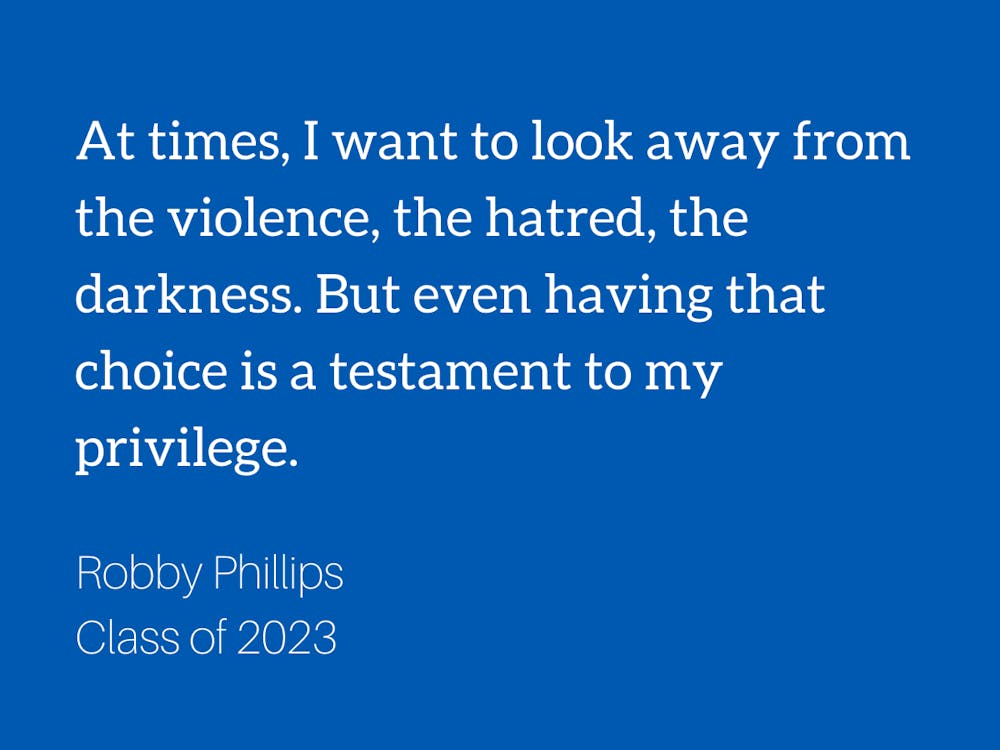I have never believed myself to be racist. But I haven’t been anti-racist either. I began to understand this more fully when I attended a Durham for All webinar shortly after the killing of Ahmaud Arbery became public. A Black woman from Durham expressed with exasperation and passion how White people need to be fighting the way Black people have to for their lives if the system is going to change.
While that brief description does not do her message justice, I couldn’t help but feel shaken afterwards. I have often treated White supremacy as a problem I could address on occasion, when it was most apparent and violent. I felt that by posting on social media and calling people out for outright racist rhetoric, I was doing enough. But as a White person, that’s the bare minimum.
I have often chosen comfort over difficult conversations. I have called people out for using the N-word, but not fiercely enough. I have let casual “jokes” brush by, acting like I didn’t hear them rather than shutting them down. I have inevitably internalized racism from a system built on White supremacy. I have failed to be anti-racist in countless ways, as so many of us have. We must and can do so much better.
In addressing the killings of George Floyd, Breonna Taylor, Ahmaud Arbery, Tony McDade and countless others (and so many whose names we will tragically never know), and the protests and riots that have unfolded in response, I—and most White people—tend to talk as if we are on the outside, looking in. We discuss and address White supremacy as if it is a problem of Black people on which we can offer commentary. It is clear to me now that White supremacy is our problem, and it is entirely our responsibility to dismantle it.
It is our responsibility to teach our family and friends how White supremacy is still deeply ingrained in our society. At the same time, it is not the responsibility of White people to turn protests violent, knowing that Black people will be blamed and suffer the consequences. It is also not our responsibility to tell Black people how they should protest and fight back when their people are murdered in cold blood without consequence. The people who relentlessly criticized public figures like Colin Kaepernick for taking a knee during the National Anthem or told LeBron James to “shut up and dribble" do not get to be advocates for peaceful protest, when nothing has changed despite all the ways Black people have protested peacefully for years.
In the last couple weeks especially, I have reflected on my own internalized racism and inaction. Being not racist and being anti-racist are not the same. At times, I want to look away from the violence, the hatred, the darkness. But even having that choice is a testament to my privilege. If we as white people continue to use our privilege and ignore the problem or only address it selectively, we are perpetuating racism. We must actively dismantle the White supremacy that plagues every facet of society.
I have heard some of my White peers at Duke say they don’t think it’s their place to speak up on issues like the murder of Black people. Although it is crucial that the voices of Black activists lead the movement, I can assure you it is essential for us to be a part of that movement. The very least we can do is raise awareness and speak up. Being apolitical or neutral is only an option for those whose lives are not on the line. To quote social justice activist Desmond Tutu, “If you are neutral in situations of injustice, you have chosen the side of the oppressor.” There are not two fair sides, as we are told to believe. There are not “very fine people” on both sides. There is humanity and there is hatred. The latter often disguises itself as neutrality or law and order.
I don’t have all the answers. I hardly have any of them. But White people have to do more than post to our Instagram stories. As Duke students we must look around and ask ourselves what we can do differently, have tough conversations with each other, with our friends and family, and not only when it’s convenient or seems trendy on social media. We can start by better understanding our own history and where we can go from here, by reading past Chronicle columns like this one or watching Ava Duverney’s “13th” on Netflix. We must learn how to actively be anti-racist, and read books like Ibram X. Kendi’s “How to Be an AntiRacist”. We should be attending protests—while protecting ourselves from the ongoing pandemic—alongside the Black people who are putting their lives on the line, using our privilege to protect them. Consult resources like this to find concrete steps to take, places to donate and organizations to join.
My purpose in writing this article is not to lecture or act like I know better than anyone else. I have so much work to do on myself. I am engaging in perpetual self-reflection about my own actions and words and those of the people with whom I surround myself. I think all White people should take the time to do the same. In doing so, I have realized the great responsibility I have as a White man to promote anti-racism in all areas of my life. This is a responsibility all White people share, because White supremacy is our problem, and we must strive to eradicate it in all areas of our lives. Until we do that, we cannot expect peace, nor should we desire it.
Robby Phillips is a Trinity sophomore.
Get The Chronicle straight to your inbox
Sign up for our weekly newsletter. Cancel at any time.

